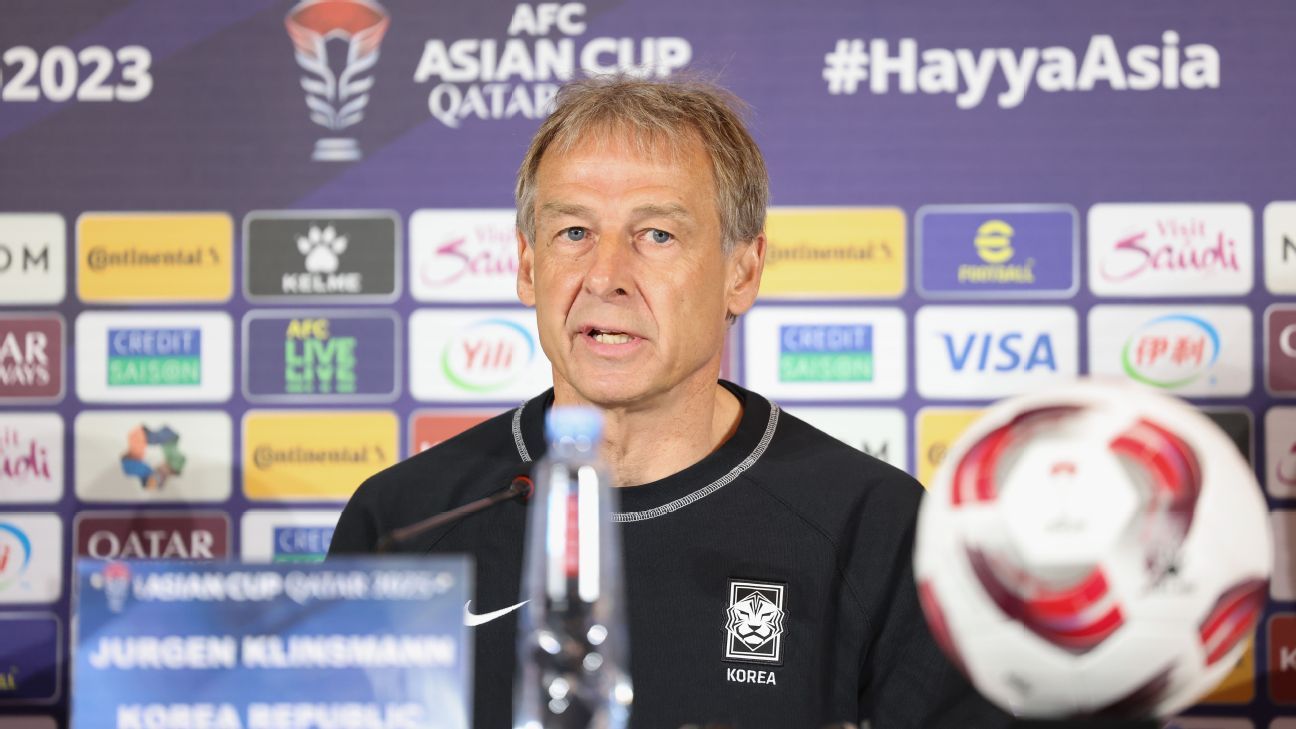DOHA, Qatar -- Jürgen Klinsmann's message to his South Korean players as they prepare for a pivotal Asian Cup semifinal against Jordan is a simple one: Relax.
After a shaky group stage that saw them advance in second place, South Korea recorded back-to-back wins over fellow Asian powers Saudi Arabia and Australia to move into the semifinals and set up a meeting with Jordan on Tuesday.
- Stream on ESPN+: LaLiga, Bundesliga, more (U.S.)
In both of their knockouts, they fell behind and were forced to stage a late fightback, equalising in the 99th minute against the Saudis and the 96th minute against the Socceroos before going to win on penalties and in extra time respectively.
They're performances that have seen the team's style christened as 'Zombie Football' by their fans, in line with their coach's belief that teams needed to be willing to "suffer" to progress in tournament football.
"To stay relaxed and to look forward to it; to eliminate all the things that are not important right now," Klinsmann said when asked what advice he'd give his players.
"This group of players, they are experienced, they are so motivated, they are so positive. They just want to go all the way through to the final and prove their point. They know what to do."
Klinsmann is familiar with the grind of tournament football. As a player, he advanced to the 1990 World Cup final after a penalty shootout win over England and at Euro 96, after missing his nation's penalty shootout win over England in the semis, he captained Germany to an extra-time win over Czechia in the final. "Once you get on a roll in a tournament, once you get your first couple of games out of the way, you build more and more confidence," he said.
"Now the confidence is there because we went through very difficult games with dramatic moments and now the country also jumps behind you and says 'Oh, actually we can do that!' and it turns into something very positive.
"It's very, very psychological. It's a mental thing. It's why I've always said that a tournament is mental. You've got to build that confidence, you've got to be prepared for a marathon. Now we go towards the end of that marathon. And hopefully, we can win it all."
Despite their sluggish start to the tournament, the exit of AFC heavyweights Japan has seen Korea become favourites at the Asian Cup, given a 33.4% chance to win the tournament by Opta over Iran, who beat Japan in the quarterfinals, and their 30.4% odds.
Such a triumph would meet the enormous expectation that has followed this team in Doha, with a golden generation of players highlighted by Son Heung-min seeking to end a 64-year continental drought.
"Pressure is always on, it's not just specific to this tournament," midfielder Hwang In-Beom said through a KFA translator. "Pressure is always on as a football player... at the club level or a national team level. We live with pressure.
"It's a privilege to play under pressure. It's a privilege that only professional athletes can go through. What's important is to trust my teammates, to trust the coach and all the technical staff.
"[We] have the belief and trust from the nation and the fans back home. And now it's time to deliver. It's time to deliver and pay back the belief that they're showing in us." Standing in Korea's way at the Ahmad bin Ali Stadium is Jordan, the tournament's surprise packets who have already shown they can frustrate their foes: drawing 2-2 with them in a group stages in a fixture in which Korea needed an injury-time own goal to salvage a point.
Korea will be without Bayern Munich defender Kim Min-Jae after he was suspended for accumulating too many yellow cards, while Jordan coach Hussein Ammouta expects Montpellier attacker Musa Al-Taamari will be available despite the 26-year-old being limited in training on Sunday.
"Despite playing 120 minutes twice, everyone knows the value of the [Korea] individually and collectively," Ammouta said through a translator.
"Sometimes it doesn't mean anything because professional players with [72] hours can very easily recover physically and mentally. Asian national teams are very professional. I don't think the 120 minutes will make any difference.
"Today, everyone is mentally strong. You will not see any rival team with less passion, less focus, or less will to win. We need to focus, we need to develop our tactical side.
"It's very easy to be physically ready and mentally ready. It's the tactical aspects that make the difference. What we've focused on is the tactical development and improvement that will make a difference in such games."

